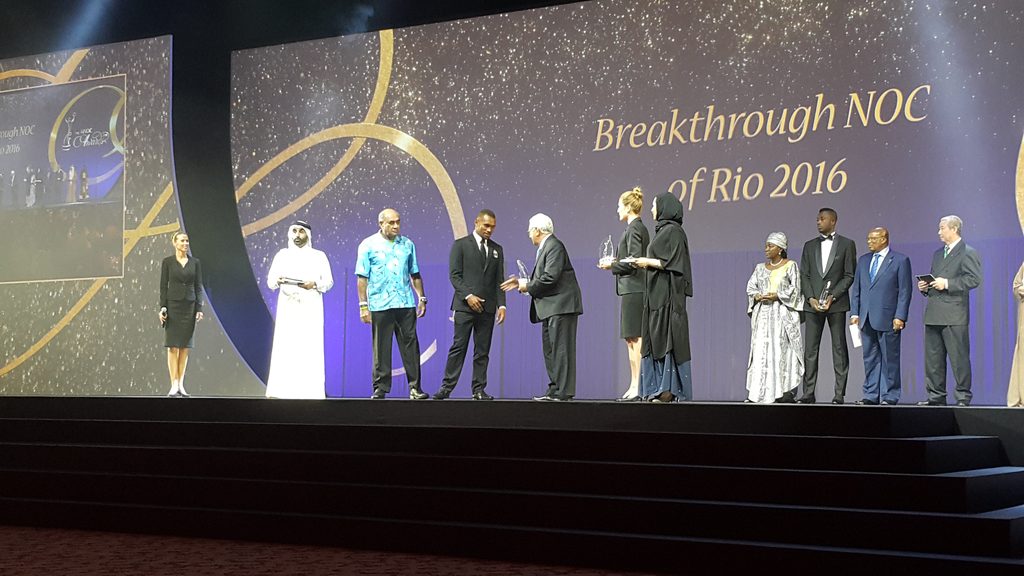The scenic coastal town of Cascais, Portugal, served as the backdrop for a landmark gathering of the Olympic Movement, as the XXVII ANOC General Assembly drew to a close with groundbreaking discussions on artificial intelligence, athlete safeguarding, and the evolving Olympic programme.
The five-day event, which brought together over 1,000 participants from 206 National Olympic Committees (NOCs), culminated in the prestigious ANOC Awards ceremony, where European nations dominated the celebrations of athletic excellence from the Paris 2024 Olympics.
The French Olympic Committee emerged as the evening’s biggest winner, claiming the Outstanding NOC award after hosting their most successful Olympics in over a century. French NOC President David Lappartient accepted the honour recognizing the host nation’s extraordinary haul of 64 medals, including 16 golds, achieved before passionate home crowds.
Fiji NOC was represented at the assembly by president Makarita Lenoa and secretary general Vanessa Kilner. Fiji has previously earned recognition for their outstanding Olympic achievements, having won the Breakthrough NOC award and Best Men’s Team award for their historic Rugby 7s victory at the 2016 Rio Olympics.
Italy’s women’s volleyball team wrote their names into the history books, earning the Best Female Team award after an unprecedented perfect run to gold without dropping a single set. Denmark’s men’s handball team, who demonstrated remarkable resilience by bouncing back from their Tokyo 2020 silver to claim gold in Paris, was named Best Male Team.
The British women’s cycling team sprint squad of Katy Marchant, Sophie Capewell, and Emma Finucane captured the imagination of the sporting world by breaking the world record three times en route to victory, earning them Best Female Team in an Individual Sport. Austria’s sailing duo of Lara Vadlau and Lukas Mähr topped off European success by winning Best Mixed Team in an Individual Sport for their mixed dinghy triumph.
Beyond the celebrations, the General Assembly tackled crucial challenges facing modern sport. Three special theme sessions brought together experts and stakeholders to address key issues shaping the Olympic Movement’s future. The Olympic AI Agenda session, moderated by IOC Chief Technology Officer Ilario Corna, explored how artificial intelligence is already transforming NOC operations and its potential future impact.
“The ANOC General Assembly serves as a critical platform to showcase the strength and unity of the Olympic Family through the exchange of knowledge and best practices,” noted ANOC President Robin Mitchell and Secretary-General Gunilla Lindberg in a joint statement. Their words reflected the assembly’s focus on collaboration and sustainability, themes that ran throughout the week’s proceedings.
The gathering also saw important administrative decisions, with the General Assembly approving the Audited Financial Statements for 2022-2023 and setting in motion the development process for the Strategic Plan 2025-2028. Commercial partnerships were highlighted, including collaborations with Peak Sport, JOY Billiards, Bluewater, and Wiz Team, demonstrating the Olympic Movement’s continued commercial appeal.
Looking ahead, Hong Kong, China, was confirmed as the host for the 2026 General Assembly by the Executive Council, ensuring the Olympic Movement’s commitment to global representation continues.
As delegates departed Cascais, they carried with them not just awards and accolades, but also fresh perspectives on artificial intelligence, athlete protection, and environmental sustainability.
These insights, combined with the practical strategies and partnerships formed during the assembly, will shape the Olympic Movement’s trajectory in the years to come, demonstrating that while the Games themselves may be the movement’s crown jewel, it’s in meetings like these that its future is crafted.



